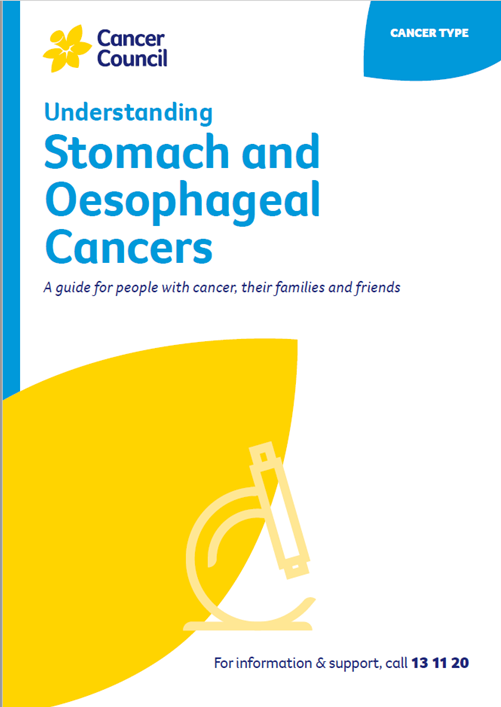- Home
- Stomach cancer
- About stomach cancer
About stomach cancer
In this section we discuss what stomach cancer is, who gets it and what causes it.
Learn more about:
- What is stomach cancer?
- The stomach
- Other types of stomach cancer
- Who gets stomach cancer?
- What causes stomach cancer?
What is stomach cancer?
Stomach cancer develops when cells in any part of the stomach grow and divide in an abnormal way. Tumours can begin anywhere in the stomach, although most start in the stomach’s inner layer (mucosa). This type of cancer is called adenocarcinoma of the stomach, or gastric cancer.
If it is not found and treated early, stomach cancer can spread to nearby lymph nodes or to other parts of the body, such as the liver and lungs. It may also spread to the lining of the wall of the abdomen (peritoneum). Rarely, it can grow through the stomach wall into nearby organs such as the pancreas and bowel.
The stomach
The stomach is part of the upper gastrointestinal (GI) tract, which is part of the digestive system. The digestive system helps the body break down food and turn it into energy.
The stomach is a hollow, muscular sac-like organ. The top part of the stomach joins to the end of the oesophagus (the food pipe) and the other end joins to the beginning of the small bowel.
What the stomach does
The stomach stores food and starts to break it down (digests it). Juices and muscle contractions in the stomach break down food into a thick fluid, which then moves into the small bowel. In the small bowel, nutrients from the broken-down food are absorbed into the bloodstream. The waste moves into the large bowel, where fluids are absorbed into the body and the leftover matter is turned into solid waste (known as faeces, stools or poo).
Layer |
In the stomach wall |
| 1. mucosa (moist innermost layer) |
|
| 2. submucosa (supports the mucosa) |
|
| 3. muscle layer |
|
| 4. outer layer |
|
Anatomy of the stomach

Other types of stomach cancer
Other types of tumours can start in the stomach. These include small cell carcinomas, lymphomas, neuroendocrine tumours and gastrointestinal stromal tumours. These types of cancer aren’t discussed in this booklet and treatment may be different. Call Cancer Council 13 11 20 for more information.
Some cancers start at the point where the stomach meets the oesophagus (called the gastro-oesophageal junction). Depending on the location of the gastro-oesophageal cancer, it may be treated similarly to stomach cancer or oesophageal cancer.
Who gets stomach cancer?
About 2580 people are diagnosed with stomach cancer in Australia each year. Men are almost twice as likely as women to be diagnosed with stomach cancer. It is more common in people over 60, but it can occur at any age.
What causes stomach cancer?
The exact causes of stomach cancer are not known. Research shows that the factors listed below may increase your risk. Having one or more of these risk factors does not mean you will develop cancer. Many people have these risk factors and do not develop stomach cancer.
Some of the known risk factors include:
- older age (being over 60)
- infection with the bacteria Helicobacter pylori (H. pylori)
- smoking tobacco
- low red blood cell levels related to pernicious anaemia
- a family history of stomach cancer
- having an inherited genetic condition like familial adenomatous polyposis (FAP), Lynch syndrome, hereditary diffuse gastric cancer (HDGC), or gastric adenocarcinoma and proximal polyposis of the stomach (GAPPS)
- chronic inflammation of the stomach (chronic gastritis)
- carrying extra body weight (overweight or obese)
- drinking alcohol
- eating salt-preserved foods (e.g. ham)
- having a sub-total gastrectomy for a non-cancerous condition.
→ READ MORE: Stomach cancer symptoms
More resources
Prof David I Watson, Matthew Flinders Distinguished Professor of Surgery, Flinders University, and Senior Consultant Surgeon, Oesophago-Gastric Surgery Unit, Flinders Medical Centre, SA; Prof Bryan Burmeister, Senior Radiation Oncologist, GenesisCare Fraser Coast and Hervey Bay Hospital, QLD; Kieran Cahill, Consumer; Jessica Jong, Clinical Dietitian, Upper GI and Hepatobiliary Services, Peter MacCallum Cancer Centre, VIC; John Leung, Consumer; Prof Rajvinder Singh, Professor of Medicine, University of Adelaide, and Director, Gastroenterology Department and Head of Endoscopy, Lyell McEwin Hospital, SA; Dr Sarah Sutherland, Medical Oncologist, Chris O’Brien Lifehouse, NSW; Paula Swannock, Upper GI Cancer Nurse Consultant, St Vincent’s Hospital Melbourne, VIC; Rebecca Yeoh, 13 11 20 Consultant, Cancer Council Queensland.
View the Cancer Council NSW editorial policy.
View all publications or call 13 11 20 for free printed copies.

